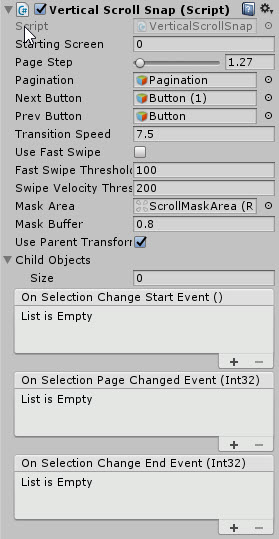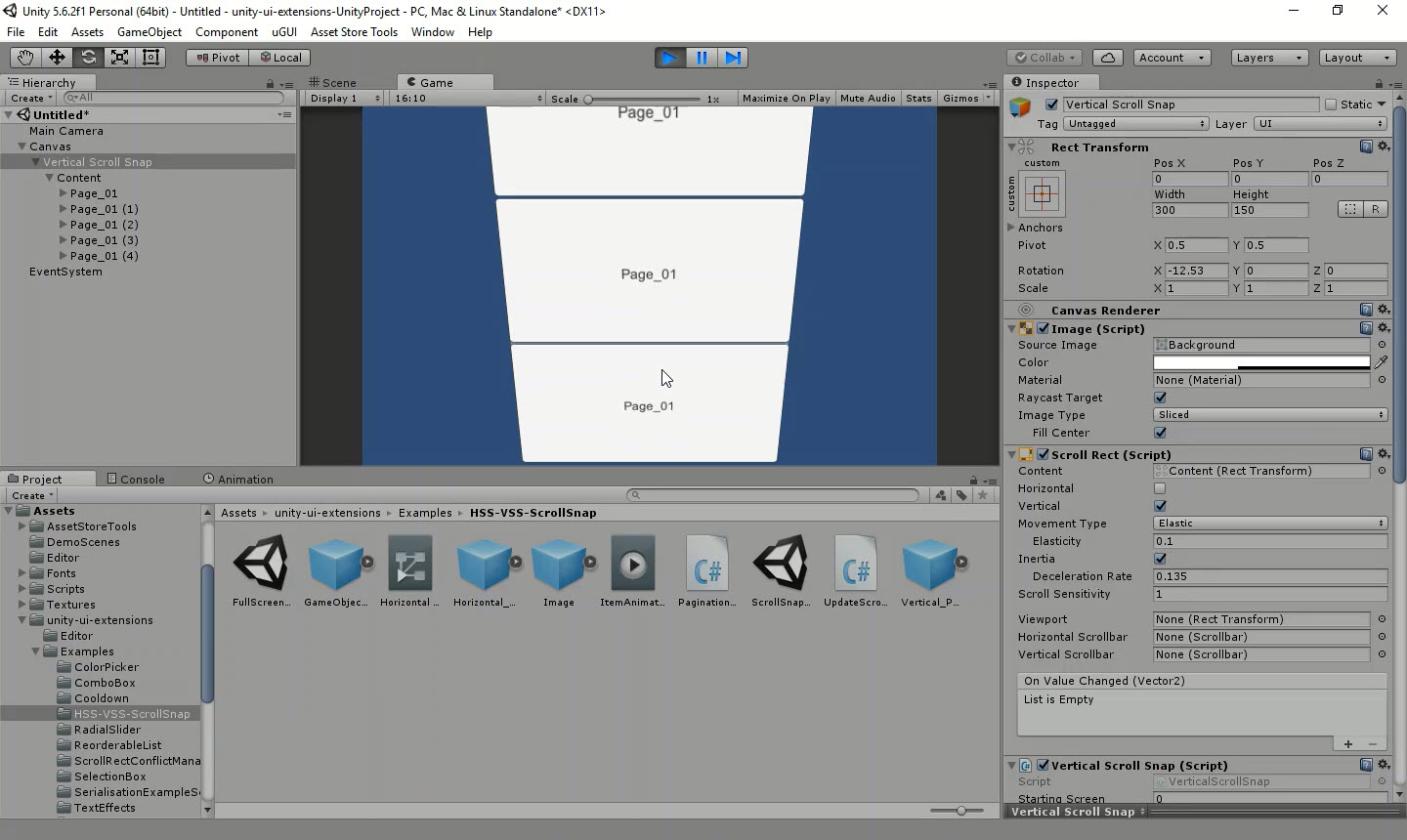Unity UI Extensions
Vertical Scroll Snap
A paged scroll rect that can work in steps / pages, includes button support. Now also supports infinite scrolling.
Contents
1 Overview
3 Methods
4 Usage
6 See also
Overview
A scroll snap style control which is focused on a Vertical layout, enabling a paged view of child elements. Pages can be moved by keys, swipes or via the use of buttons.

Now also supports infinite scrolling and additional events for when pages change.
As of Update 1.6, now also supports Scrollbars, Note Can only use the Vertical scrollbar in alignment with the direction of the ScrollSnap
Properties
The properties of the Vertical Scroll Snap control are as follows:
| Property | Description |
|---|---|
| Starting Screen | The child page that should be displayed on start. Bound to the limits of either the scene child objects or the “Child Objects” array. |
| Page Step | The distance between pages based on the current width of the control. Higher value equals more spacing. |
| Pagination | The GameObject with a Toggle group that controls toggles active state. Recommended one toggle per-page. |
| Next Button | Button to instruct the control to move to the next page. |
| Prev Button | Button to instruct the control to move to the previous page. |
| Transition Speed | Speed at which the control lerps between pages |
| Use Fast Swipe | When enabled, a swipe only moves to the next page (unless below Fast Swipe Threshold. E.G. slow swipe / drag) |
| Fast Swipe Threshold | An offset height the user must swipe to go to the next / prev page based on the panel height. Swipe more than the Height + Threshold and the control reverts to normal swipe behaviour |
| Swipe Velocity Threshold | Slowest speed the control must travel at to settle on a page. |
| Mask Area | Maskable area for control, pages outside this area will be made inactive. Used in conjunction with the Mask Buffer. Recommended to also add a RectMask2D to MaskArea GO. |
| Mask Buffer | The amount of page buffer to surround the Mask Area and control which pages are active / inactive. Lower value equals more active pages. |
| Jump On Enable | By default the container will lerp to the start when enabled in the scene, this option overrides this and forces it to simply jump without lerping |
| Restart On Enable | By default the container will stay on the current selection, this option overrides this behaviour and returns to the original starting page when enabled. |
| Use Parent Transform | When using prefabs in the ChildObjects array, the control with use the prefab transform values instead of resetting to the parent. |
| Child Objects | An array of prefabs to load the control with. Can EITHER add children in to the scene or via this array but NOT both. |
| On Selection Change Start (event) | The Event fired when the user starts changing the page via swipe or mouse |
| On Selection Page Changed (event) | The Event fired when the current page changes, either via swipe, mouse, Next/Prev Buttons |
| On Selection Change End (event) | The Event fired when the page settles after being changed by swipe or mouse |
Additional properties available in code
| Property | Return Type | Description |
|---|---|---|
| CurrentPage | int | The current snapped page, or selected page as the user swipes |
Methods
| Method | Arguments | Description |
|---|---|---|
| DistributePages | N/A | Forces a refresh of the currently available Scroll Snap Pages |
| Add Child | Go (GameObject) | Add a new child to this Scroll Snap and recalculate its children |
| Add Child | Go (GameObject), WorldPositionStays (bool) | Add a new child to this Scroll Snap and recalculate its children, and resets the world position of the new child. |
| Remove Child | index (int), (out) ChildRemoved (GameObject) | Remove a new child to this Scroll Snap and recalculate its children, outputs the removed object to a variable. |
| Remove Child | index (int), WorldPositionStays (bool), (out) ChildRemoved (GameObject) | Remove a new child to this Scroll Snap and recalculate its children, outputs the removed object to a variable. Resets the world position of the removed GameObject. |
| RemoveAllChildren | (out) ChildrenRemoved (GameObject[]) | Remove all children from this ScrollSnap, outputs a GameObject array of all removed children. |
| RemoveAllChildren | WorldPositionStays (bool), (out) ChildrenRemoved (GameObject[]) | Remove all children from this ScrollSnap, outputs a GameObject array of all removed children. Resets the world position for all removed children. |
| UpdateLayout | (optional) Bool | Used for changing / updating between screen resolutions, if the argument is true, the current page will be reset to the StartingScreen. |
Usage
Like with other Layout controls, simply add this to the parent RectTransform for a collection of child elements through the Add Component menu as follows:
“Add Component -> Layout -> Extensions -> Vertical Scroll Snap”
Or alternatively, add the default layout for the control using:
“GameObject -> UI -> Extensions -> Layout -> Vertical Scroll Snap”
This will give you a standard Scroll Rect setup with the script and a single child example page.
To get access to the Current or snapped page in code, use the CurrentPage property details above. This is also updated as the user swipes. If you wish to update linked content based on the current page, I recommend using the OnSelectionPageChanged event, e.g.
public VerticalScrollSnap vss;
// Start is called before the first frame update
void Start()
{
vss = GetComponent<VerticalScrollSnap>();
}
// Update is called once per frame
void Update()
{
//Checking for the Currentpage
var theSelectedPageIs = vss.CurrentPage;
}
Video Demo
The main Vertical / Horizontal demo
A simple walk-through setting up the Scroll Snap with a perspective view
See also
Credits and Donation
BinaryX, SimonDarksideJ

